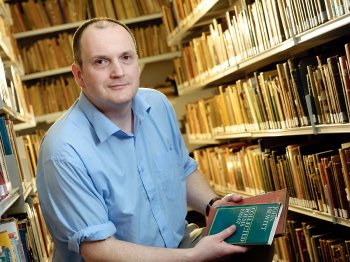
The School of English and History at the University of Ulster is inviting schools and community groups across the province to get involved in a major research projecton local culture and heritage by hosting workshops and talks exploring the mostly unknown, yet highly-influential, l8th and 19th century, Ulster-Scots poets.
The workshops and talks, which are free of charge and which will be facilitated by the University, are part of a wider project that will culminate next year in the launch of an interactive website dedicated to making the works of these writers (sometimes referred to as Rhyming Weavers – although many were not actually weavers) accessible to everyone in Northern Ireland and beyond.
University of Ulster English lecturer and Ulster-Scots Poetry Project manager, Dr Frank Ferguson, along with co-researchers Dr Kathryn White and Dr Carol Baraniuk, recently hosted a successful event at Glenlola College, Bangor and talks in a number of public libraries, but Dr Ferguson is appealing for more schools and groups to get involved.
He says: “As part of this project, and in order to develop awareness of this rich tradition of writing, we arecarrying out anoutreach programme covering both Ulster and Ulster-Scots Poetry for schools, libraries, community groups and poetry and local history groups.
“The outreach programme will help ordinary people, of all ages, gain knowledge and insights into the Ulster-Scots tradition of poetry, the cultural and linguistic relationships between Ireland and Scotland, and the impact that this has made onfamous writers from the north of Ireland such as Seamus Heaney, John Hewitt and Michael Longley.
“We are currently developing a webdatabase of the Ulster-Scotspoetry that is housed in the John Hewitt Special Collectionat the Coleraine campus and other archives in Northern Ireland.
“The pupils and teachers at Glenlola really enjoyed the workshop and we would love to visit many more schools in 2012.
“Although the school workshops are primarily aimed at students studying the A-level English syllabus, we would be happy to tailor the workshops to the specifications of what an individual school would like.
“Library and group workshops (which are run in partnership with the BBC) usually take the form of a talk with slideson John Hewitt, his book collection and his significance as a poet and critic and are then followed by a discussion on an Ulster-Scots poet whom Hewitt would have collected or written upon and we usually aim to have a local poet's work discussed in the area in which we will be talking.
“We are happy to facilitate these outreach events free of charge and no prior knowledge of Ulster-Scots poetry or language is required.”
Ulster-Scots poets such as James Orr, Samuel Thompson and Sarah Leach documented their ideas and thoughts about love, nature, life and politics during the late 18th and early 19th centuries, and although they would have been very well-known in their local communities at the time when they were writing, most have never received the modern-day interest and recognition they deserve.
Adds Frank: “One of the main traits of Ulster Scots poetry is awareness of language, so the poets wrote in a mixture of language - a bit like the way Seamus Heaney works today.
“These writers used language as a creative medium to move in and out of different ideas and themes and means of expression.
“Some also used it as a sort of code, so that outsiders or censors, or people who might throw you in jail for what you wrote, wouldn’t get the hidden meaning in the poem.
“It was actually a very intelligent and creative form of writing poetry.
“The University of Ulster Project hopes to raise awareness of these talented men and women by offering an accessible and easy way for everyone to enjoy their work and to show that Ulster Scots poetry is an extremely important element of Irish cultural heritage.”
"The next Ulster-Scots Poetry Project library talks will be held in the Shankill Road Library on January 19 and Cookstown Library on January 26.
If your school or group is interested in an Ulster-Scots workshop or talk, or would like more information on the project, please contact Dr Frank Ferguson on: 028 70123577, or email: f.ferguson@ulster.ac.uk
For Press enquiries, contact Audrey Watson on: 02890 366386/Mob: 075 401 39366. Email: a.watson1@ulster.ac.uk.
Caption: Dr Frank Ferguson

















